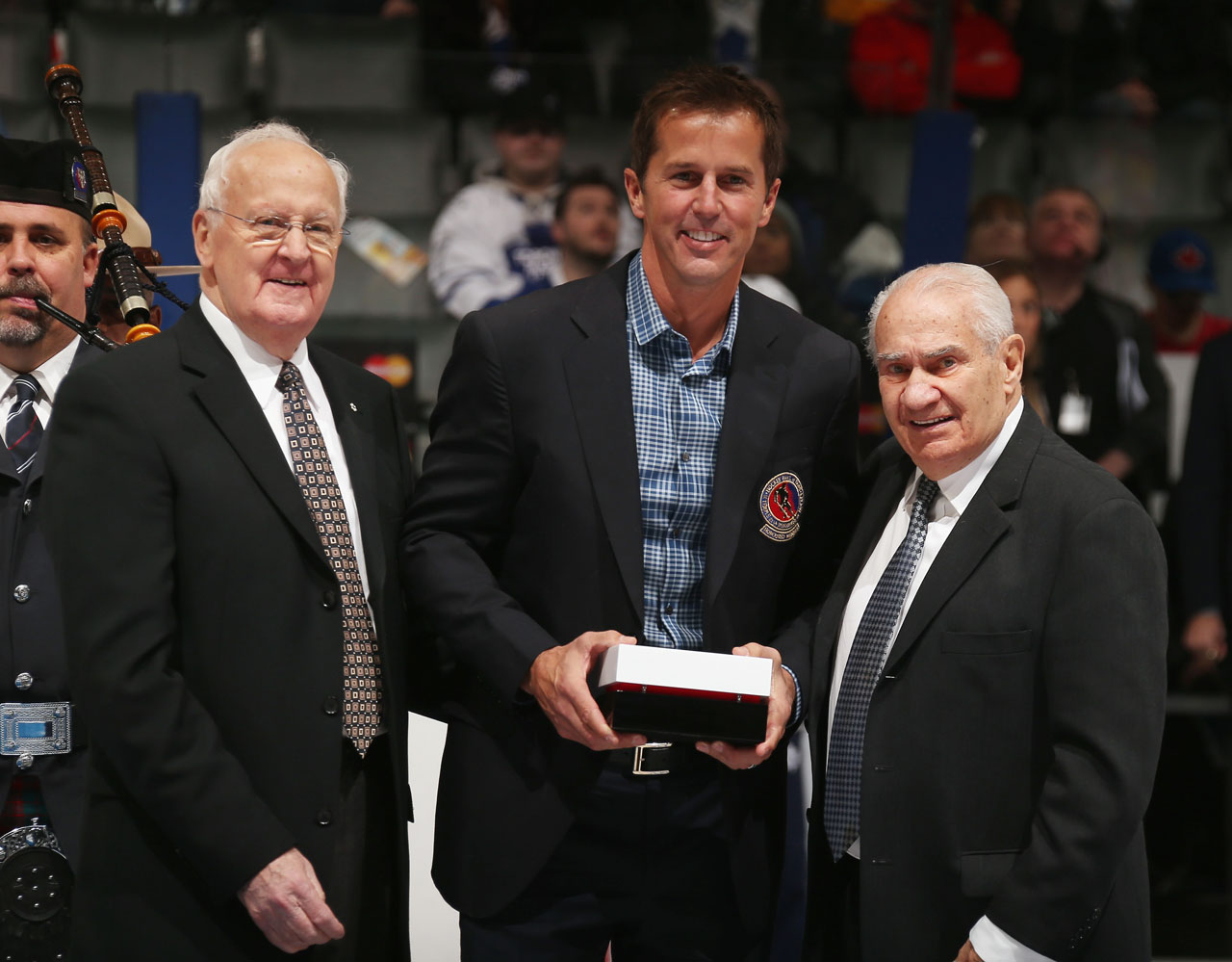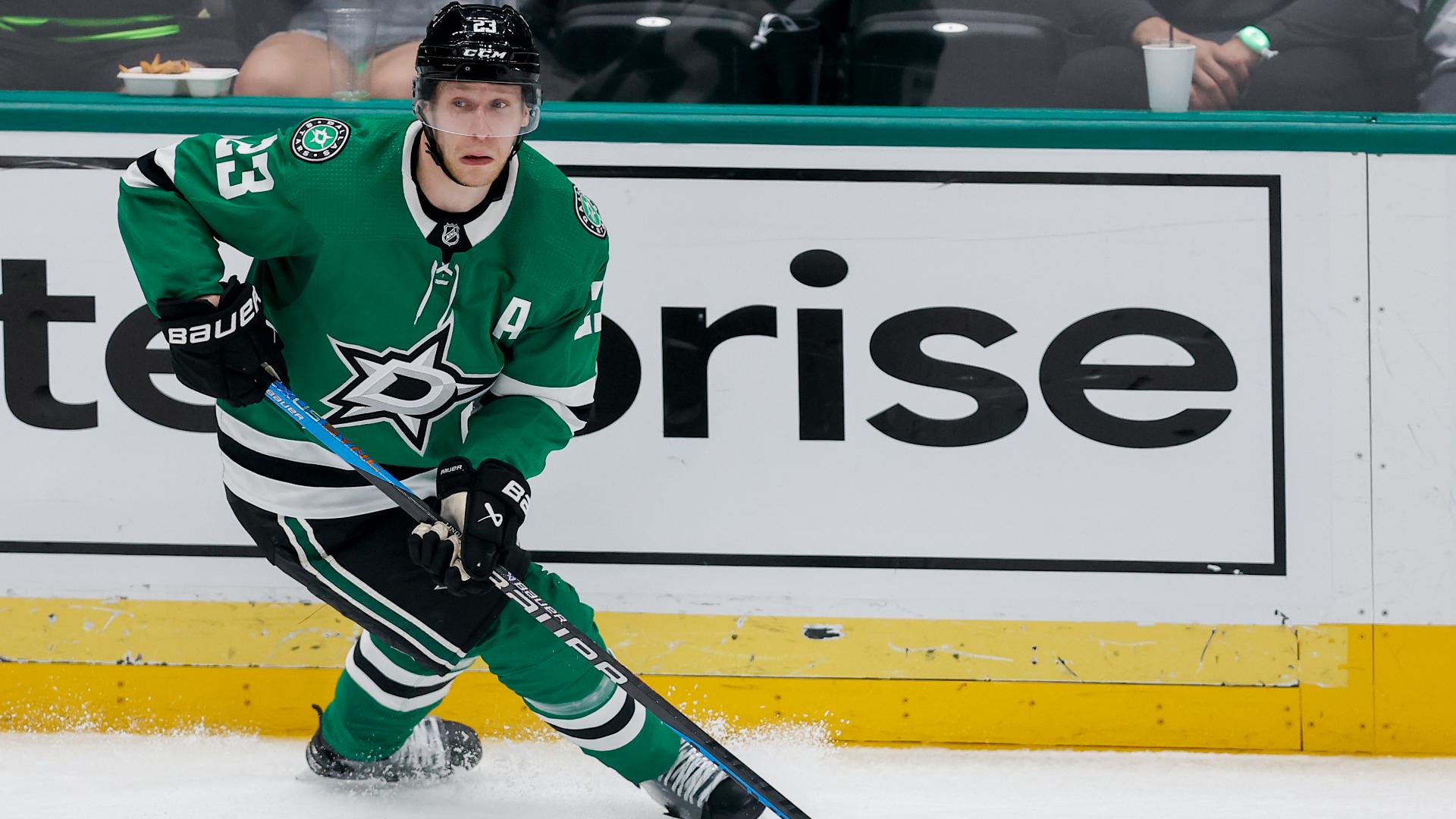![2014 Hockey Hall Of Fame - Legends Classic[ID=19209409] ID=19209409](http://www.gannett-cdn.com/-mm-/9fe846de0d16cac2529217fc048286151e9d5643/c=15-63-1260-999&r=115x86/local/-/media/WFAA/WFAA/2014/11/18/635518806688320129-1117-modano-hof02.jpg) TORONTO (AP) — Mike Modano, the best hockey player ever born in the United States, joined the sport's elite Monday night as he was enshrined in the Hockey Hall of Fame along with Dominik Hasek, Peter Forsberg, Rob Blake, referee Bill McCreary. and former coach Pat Burns, who died in 2010.
TORONTO (AP) — Mike Modano, the best hockey player ever born in the United States, joined the sport's elite Monday night as he was enshrined in the Hockey Hall of Fame along with Dominik Hasek, Peter Forsberg, Rob Blake, referee Bill McCreary. and former coach Pat Burns, who died in 2010.
Modano, 44, spent all but one year of his NHL career with the Dallas Stars and the Minnesota North Stars. He retired in 2011 and remains the all-time scoring (561 goals) and points (1,374) leader for American players in the league.
He was also a part of the Stars' only Stanley Cup championship season in 1999.
Last year, Dallas retired his No. 9 in a moving ceremony at the American Airlines Center.
A few months ago, Line Burns was driving to see a friend and stopped in Gilmanton, New Hampshire, where she used to live with her husband.
She was gassing up her car and getting something to eat when her phone rang. On the other end were Pat Quinn and John Davidson from the Hockey Hall of Fame telling her that Pat Burns would finally be enshrined four years after his death.
"It was meant to be," she said. "He was probably laughing up there."
Line (pronounced Lynn) recalled recently how she and her husband used to laugh so much at home. She couldn't help but laugh that night when a video montage of Burns' best and angriest coaching moments were shown on the video screens at Air Canada Centre.
Those included him winning the Stanley Cup with the New Jersey Devils, yelling at referees and going after Barry Melrose.
"I'm sure it wasn't fun at that time," Line said, "but it was hilarious."
Burns went into the Hockey Hall of Fame on Monday night along with Hasek, Forsberg, Modano, Blake and McCreary.
Burns' son, Jason, had specific instructions from his father on how to deliver the Hall speech. Pat Burns told his son to thank Charlie Henry, Wayne Gretzky and the organizations he coached for and their fans.
Pat Burns didn't dwell on not making it even as he was dying of cancer.
"I remember him saying, 'Cheer Up Jason, I'll get in there someday probably. You better have a good speech ready because you're the one going up there for me,'" Jason Burns said Monday night. "Here I am with big shoes to fill."
There was some quiet anger that the selection committee didn't get it done before Burns died of cancer on Nov. 19, 2010. But more than anything else there was relief and joy that the coach received his due.
"In addition to being a great coach, he was widely respected throughout the hockey world for being a terrific person," Commissioner Gary Bettman said Monday. "It's nice to see somebody like Pat recognized and having his legacy preserved."
Davidson has been on the committee for many years but was serving as chairman for the first time. He said the process is different every year.
"You have different people that vote for different reasons," he said. "I don't want to go and think about the past and what happened or didn't happen. He's in, he deserves to be in and his wife and his family are ecstatic and that's just the way it should be."
Burns clearly had a resume that merited induction.
After 17 years as a police officer in Gatineau, Quebec, he led the Hull Olympiques to the Quebec Major Junior Hockey League title and coached in the American Hockey League before making his way to the NHL. There, in 14 seasons he won the Jack Adams as coach of the year three times — with the Montreal Canadiens, Toronto Maple Leafs and Boston Bruins.
"Pat Burns was the best coach I had during my career in the National Hockey League," said Mats Sundin, a Hall of Fame center. "He meant everything for me as I came to the Maple Leafs and also became the captain, too. He really taught me everything."
Burns made the Cup final with the Canadiens and got the Leafs to Game 7 of the Campbell Conference final in 1993, when they lost to the Los Angeles Kings. He had a career winning percentage of .573 and reached the pinnacle of the sport with New Jersey in 2003.
Line Burns believed her husband was proudest of winning the Cup because it was "a big dream of his." So much so that they slept with the trophy that June 9 night.
Asked how her husband would have felt if he were alive for this moment Monday night, she said: "He would've been so honored. He would've been very humbled — probably speechless for the first time in his life."
Burns was never the silent type. Blake got a kick out of seeing highlights of him hollering at officials, and Hasek described the coach as having "the kind of emotion you like."
"Pat was very emotional, but he always made his players accountable," McCreary said. "He never passed that on to the officials. He made them accountable for their actions. Pat and I had some go-'rounds, but he was very professional. He never held a grudge."
Modano almost played for Burns in Hull, but the Olympiques chose to take another player instead. Over his NHL career, the longtime Minnesota and Dallas center said he talked to plenty of teammates who enjoyed playing for Burns.
"Pat was phenomenally respected around the league, one of those coaches that players I heard loved playing for," Modano said. "Mutually respected between coaches and teammates and that's all you could always ask for. He's upfront, honest, told you where you stood, what was your role. Those are usually the best guys."
Line Burns recalled how different her husband was at work and at home.
"I knew the two different Pats," she said. "One was at work, so focused, so disciplined, he was so focused. I never saw a guy focused like that. At home, my God, he was a pure joy. He was so funny."
In her Hall of Fame speech, Line Burns paid tribute to her husband's career and his life away from hockey.
"Pat had two goals: winning and making a difference," she said. "This honor tonight is our way to show him how much he meant to us. Healthy Pat, he taught (players) how to win. ... Unhealthy Pat taught me, our family, our friends, how to live and how to survive."


